

Interview People. Understanding wellbeing. Here we explore resilience through a series of short activities.
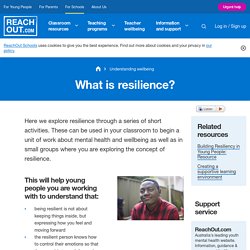
Building resilience in children. Resilience … it’s a familiar word, isn’t it?
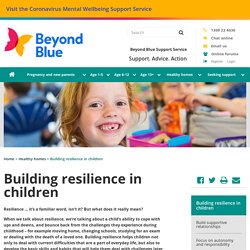
But what does it really mean? When we talk about resilience, we’re talking about a child’s ability to cope with ups and downs, and bounce back from the challenges they experience during childhood – for example moving home, changing schools, studying for an exam or dealing with the death of a loved one. Building resilience helps children not only to deal with current difficulties that are a part of everyday life, but also to develop the basic skills and habits that will help them deal with challenges later in life, during adolescence and adulthood.
Why do we over-parent? What anxious parents need to know. Opinion By Dr Rebecca Huntley Posted 22 Apr 2017, 8:54pmSat 22 Apr 2017, 8:54pm My last appearance on commercial TV was the usual morning panel where highly made-up women discuss "issues" in the newspaper headlines.
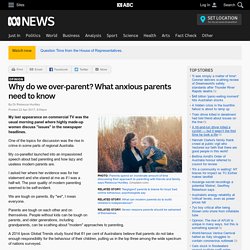
One of the topics for discussion was the rise in crime in some parts of regional Australia. Parenting Today vs The Past. Written by James Kicinski-McCoy 2:45 pm Do you every stop and think about how different the world that we live in today is, compared to when we were kids?
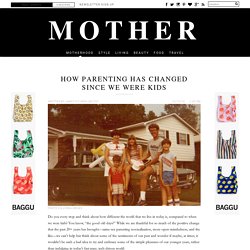
You know, “the good old days?” While we are thankful for so much of the positive change that the past 20+ years has brought—same-sex parenting normalization, more open-mindedness, and the like—we can’t help but think about some of the sentiments of our past and wonder if maybe, at times, it wouldn’t be such a bad idea to try and embrace some of the simple pleasures of our younger years, rather than indulging in today’s fast-pace, tech-driven world.
Disciplining Children in the 1950s. Disciplining children in the 1950s has often been regarded as strict, harsh and oppressive.
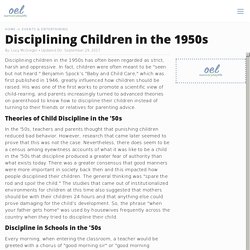
In fact, children were often meant to be "seen but not heard. " Benjamin Spock’s "Baby and Child Care," which was first published in 1946, greatly influenced how children should be raised. His was one of the first works to promote a scientific view of child-rearing, and parents increasingly turned to advanced theories on parenthood to know how to discipline their children instead of turning to their friends or relatives for parenting advice. Theories of Child Discipline in the '50s In the '50s, teachers and parents thought that punishing children reduced bad behavior. Modern parenting styles: Which are you? - TheTot.
Helicopter, Tiger, Free-Range, Lawnmower… Early Childhood expert, Dr.

Sheryl Ziegler, talks about four modern parenting styles and the impacts they’re having on children. You may have heard of this new term called Lawnmower Parenting. A teacher wrote a 900 word blog post about this new style of parenting in August 2018 that they had been observing and the country went nuts for it. Clearly it struck a nerve; why else would one anonymous blog post go viral and cause parents, educators and mental health professionals everywhere to immediately resonate with one word: Lawnmower.
The term is fairly self-explanatory, it simply means that parents today will mow down obstacles so that their kids won’t have to endure adversity. When Did Parenting Styles Change? - SOS Safety Magazine. Think back to the way you were raised or how your parents talked about the way they were raised.
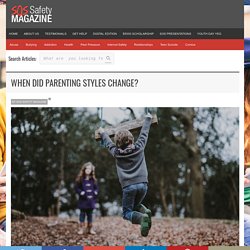
Are Young People Less Resilient Than They Used to Be? - SACS Consulting. SACS is currently undertaking a project for an organisation which has many employees working in a line of work which requires high levels of resilience.
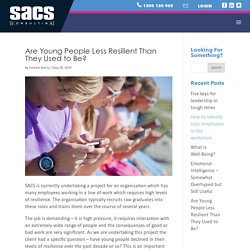
The organisation typically recruits raw graduates into these roles and trains them over the course of several years. The job is demanding – it is high pressure, it requires interaction with an extremely wide range of people and the consequences of good or bad work are very significant. Aboutkidshealth. Resilience in children Developmental psychologists agree that some children develop resilience through natural process, while others need assistance.
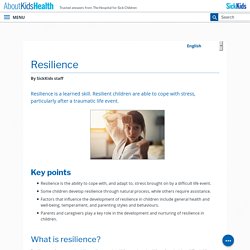
However, this doesn’t mean that those who require a little help will be less resilient over time compared to their counterparts. It’s important for parents to remember that cultivating resilience is dependent on many factors and can take some time. Finally, a child’s expression of sadness and/or emotional distress, particularly following a traumatic event, is normal. Signs of a resilient child Resilient children may display the following qualities: Protective Factors & Resiliency. 67f54b75cf899ae1b18d019fe897c91cee29. 88% of parents say being a parent is harder than ever. There's no doubt: It's a new parenting era than 20 or 30 years ago.
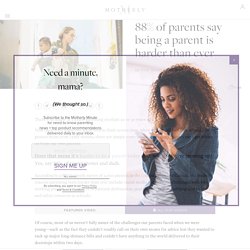
Now faced with questions about how to limit screen time, when to give children phones and how to protect them from cyber threats, there are simply some issues that today's parents can't get advice on from our own parents. Does that mean it's harder to be a parent today than when we were growing up? Yes, say 88% of young moms and dads. According to a BPI Network survey of 2,000 parents in the United States and Canada, the leading reasons parenting feels harder than ever include: social media distractions, challenges with two working parents, emotional or behavioral dysfunction, peer competition or bullying, and violence and safety concerns in schools. Regardless of whether it's true, the perception that parenting is harder than ever has contributed to some two-thirds of the respondents saying they've experienced "parental burnout.
" "Parental burnout is a state of physical, mental and emotional exhaustion," says Neil D. Understanding wellbeing. The Evolution of Parenting: Five Biggest Challenges Faced by Parents Today – Toddler's Den. Believe it or not, good parenting, parenting styles and general child care are actually a relatively new phenomenon. The scientific interest in parenting or what is the best mode to raise a child’ has come about in recent years. The responsibility of raising healthy, happy, well-adjusted kids can sometimes feel overwhelming for parents.
They’re bombarded with expert advice and societal expectations, yet often miss out on the informal support that parents half a century ago received from neighbours and extended family. We often ask ourselves why is it so hard to parent today? Was it always difficult? Whatever the answers may be, there is no doubt that the standards of “good parenting” have changed dramatically.
Build supportive relationships. Building resilience in children. Focus on autonomy and responsibility. Focus on managing emotions. Pre-school aged kids (1–5 year olds) Help your child put words to how they’re feeling. For example, for children who are developing language say, “You’re smiling – you must be happy!” Resilience Tool Kit Poster - With Explanations Teaching Resource. Comments & Reviews Write a review to help other teachers and parents like yourself. If you would like to request a change (Changes & Updates) to this resource, or report an error, simply select the corresponding tab above. Log in or sign up to join the conversation. Request a change. Strategies to help children build resilience. Educators understand the importance of building resilience in children, but knowing exactly how to promote it can be challenge. A new practice guide, released today by beyondblue, seeks to provide teachers, families and other professionals with everyday strategies to build resilience in young people and teach them to think positively.
The guide – Building Resilience in Children aged 0-12 – draws on new research and how it can be applied in schools, early childhood settings and at home with families. The strategies are based on a 12-month research project led by the Parenting Research Centre (PRC) and Australian Research Alliance for Children and Youth (ARACY). The project reviewed academic research and generated expert consensus on resilience concepts. This research was complemented by consultations with parents, children and practitioners from around the country. Understanding wellbeing. Create opportunities for personal challenge. Untitled.